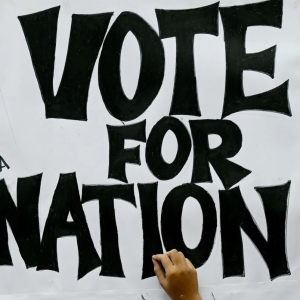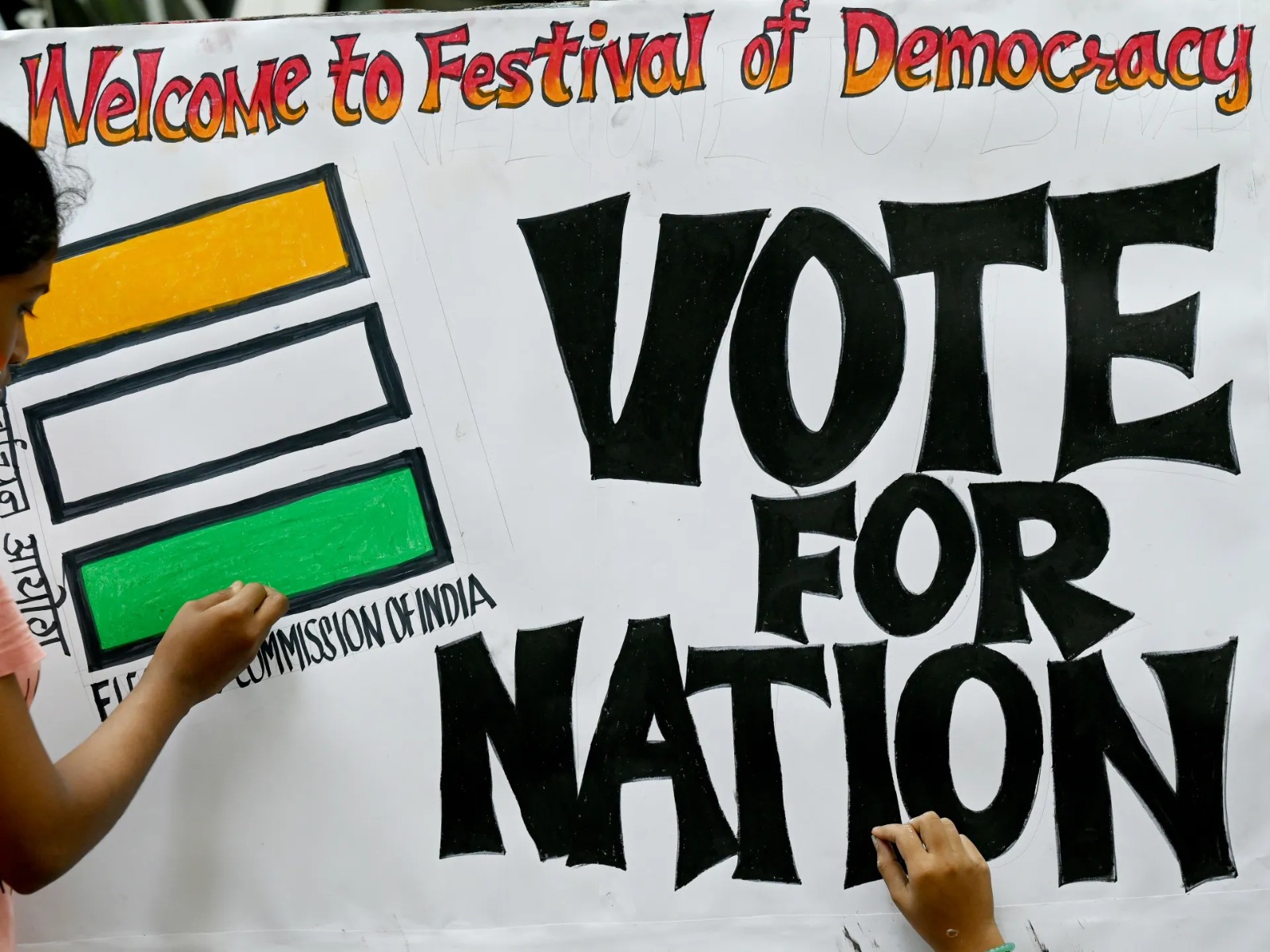
.jpg) Prakash Louis
Prakash Louis

Over 940 out of 1330 million Indian voters definitively voted for democracy and the Constitution. Clearly, 'We the People of India' opted for the 3 Cs: Constitution, Country, and Citizens. Citizens upholding the Constitution, country, and citizens as central to the past, present, and future of the people, policies, programs, and heritage of India considered this election to be 'do or die'. Hence, they were awakening themselves and others, passing on information about the sordid state of the nation, mobilising and organising everyone, and risking their life and careers to put an end to this tyrannical, divisive and destructive regime.
On the other hand, some were benefitting from the crisis and conflict that engulfed this country, supporting the anti-national and anti-citizen policies and programs of the fascist regime.
This ancient, pluralistic and ever-growing country was at the pangs of change. It stood at the threshold of opting between two alternatives. On the one hand, it could have opted for autocratic, authoritarian, abusive, aggressive, anti-democratic and anti-citizen policies and programs, politicians, political parties and regimes. On the other hand, the citizens of India could have opted for politicians, parties and regimes which would uphold the political and social democracy that Dr BR Ambedkar had painstakingly inscribed in the Constitution of the country and tirelessly worked towards his life.
The Bharatiya Janta Party (BJP) and Narendra Modi wrested power from the Congress party with many promises that it would usher in fundamental changes in the economy and politics of the country. Modi and the party he leads promised a vibrant and participatory democracy, inclusive and sustainable development, quality of life, productive youth, a globally competitive economy, open and transparent government, and pro-active and pro-people governance in its manifesto. He announced from the rooftop, "Achhe din aane waale hain."
The following were some of the promises made by Modi based on which he came to power in 2014: two crore [20 million] jobs per year; 15 lac [1.5] million in the accounts of the poor; bringing back black money from abroad; controlling inflation by establishing special courts to stop hoarding and black marketing; promised price stabilisation fund; unbundling FCI operations into procurement, storage and distribution for greater efficiency; encouraging and empowering youth via self-employment; focus on agriculture, allied industries and retail through modernisation as well as stronger credit and market linkages; initiating multi-skill development programmes, with focus on job creation and entrepreneurship; national healthcare programmes, medical education and financing for health care services; setting up AIIMS-like institutes in states.
In addition to the above, there were other promises: digitisation of government records, focus on increasing the penetration and usage of broadband, leveraging technology for e-governance; generating IT-based jobs in rural and semi-urban areas, using mobile and e-banking to ensure financial inclusion; modernisation of Madrasas; improving traditional artisanship and entrepreneurial skills; 33% reservation for women through constitutional amendment; launch of 'beti bachao beti padhao' (Save Girl Child, Educate Girl Child) campaign; improving village level infrastructure like roads, potable water, education, health, supply chain, electricity, etc., building 100 new smart cities and lastly, exploring all possibilities within the framework of the Constitution to facilitate the construction of the Ram temple at Ayodhya.
Against the 'jumlas' (false promises), public pronouncements and proclamations, the reality that the country is subjected is hard-hitting. The BJP government had promised 2 crore new jobs each year if they came to power in 2014. If realised, by March 2024, 20 crore new jobs should have materialised. As the Prime Minister, Narendra Modi, said, his government has given 1.5 times more jobs in its 10 years than the previous dispensation did in the same duration. Under the National Skills Policy 2015, the BJP laid out the goal of skilling 40 crore workers by 2022.
Further, upon assuming power, it promised to increase the share of employment in manufacturing alone by 100 million. That is a whopping 10 crore job. If we weigh all these false promises against the reality of implementation, we would know the naked truth of lies, falsehood, and cheating.
According to the Centre for Monitoring Indian Economy (CMIE), India's workforce has remained virtually stagnant at a little over 400 million over the last 5 years, meaning employment has not increased. CMIE, which did an employment survey in March 2016, shows that the unemployment rate in India was 6.64% of the labour force in December 2018. It was 5.27% in 2019, rose to 8% in 2020, and remained at 5.98% and 7.33%, respectively, in the next 2 years, and it has gone up further to 8.1% in 2023. Hence, the reality is contrary to the pronouncements and claims of the Prime Minister and his colleagues.
Unemployment and price increases have been competing to occupy first place in India in the last 10 years. While the wages of construction and agricultural workers increased by only 10.5% and 12%, respectively, in rural India from April 2021 to March 2023, the cost of cereals increased by a whopping 22%. The present regime, except for engaging in budgetary speeches, has yet to do anything to control inflation.
Price rises, especially in food items, have been soaring sky-high during the last 10 years. During 2023 summer, the price of tomatoes went from 20 to 100 rupees, while the cost of onion rose from 30 to 180 rupees, denying the poor inclusion of these essential items in their menu. Adding to the woes of India's poorest, floods have affected crops, further increasing prices. Shankar Prasad of Fatwa of Bihar lamented that though they cultivate tomatoes and onions, they cannot consume them due to the price hike. While these items are sold for 100 rupees, we get only 20 rupees per kilo.
In the last few months, the price of some items, like gas cylinders and fuel, has decreased, but the cost of some food items has increased.
|
Material |
2014 | 2021 |
If BJP comes to power in 2024 |
|
Petrol |
60.00 | 112.00 |
200.00 |
|
Diesel |
55.00 | 100.00 |
199.00 |
|
Gas cylinder |
414.00 | 834/1200/1400 |
2000.00 |
|
Rice |
18.00 | 40.90 |
60.00 |
|
Pulse |
70.00 | 190.00 |
250.00 |
|
Flour |
17.00 | 30.00 |
50.00 |
|
Oil |
52.00 | 210.00 |
400.00 |
|
Milk |
30.00 | 56.00 |
100.00 |
|
Sugar |
22.00 | 50.00 |
100.00 |
|
Egg |
2.00 | 7.00 |
15.00 |
Source: From Various Reports
In addition to mal-governance, Modi and his government engaged in some devastating steps. Demonetisation, instead of combating terror funding, fake notes and black money, resulted in widespread suffering for over 75% of the citizens. Three ordinances were brought about in the name of regularising the market in favour of the farmers. Upon realising the sinister game that Modi and his coterie were playing, the farmers opposed it tooth and nail. Modi was forced to withdraw these ordinances. The demand of the farmers for minimum support price has not been heeded by Modi.
There are other reasons why the electorate opted against 'Ab ki baar 400 par. 'Modi, instead of strengthening the existing commissions and creating new ones, weakened and destroyed all the national institutions, including the Planning Commission, Minority Commission, Women's Commission, Scheduled Caste Commission, and Scheduled Tribe Commission. Mishandling of Kashmir and Ladakh issues, alienating the people there. Eight-month-long curfews destroyed the local economy.
Worse still, there was a marked increase (72%) in the number of our soldiers martyred in just the first three years of the BJP's term. Even going to the inhuman level of using the death of army jawans for electoral purposes. It is reported that over 1 lac jobs are vacant in the railways. Instead of attending to it and responding to the ordinary passengers' demands, he kept promoting Vande Bharat, which is only for the moneyed minority. Aadhaar was made essential for any public and financial transactions, thus gathering information about the citizens.
But perhaps the unforgivable crime of Modi was to spread hate, division and violence. Instead of arresting Muslim hate, mob lynching and bulldozer justice, he vomited venom against the Muslim minority community. Misusing his position as the PM, he went around spreading all kinds of rumours and calling for violence against them.
The above-presented facts and figures are a dismal report card by any measure, but it is far from exhaustive. To be precise, Modi's views, perceptions, thoughts and behaviour are rooted and grounded in anti-poor, anti-Dalit, anti-Tribal, anti-minority, anti-OBCs, anti-citizen principles and programs. In his first term as the PM of India, Modi's image of being a tech-savvy, angry Hindu appealed to many rural youth. These were the ones who were getting into mobile culture. But they realised that except for in rhetoric, no substantial changes were intended by Modi. Youth accounted for about 83% of jobless citizens, according to a report by the International Labour Organization and the Institute for Human Development.
Modi became aggressive, autocratic, abusive, and impulsive in the run-up to the election. "India was tending towards a more autocratic country, a country with one leader who had a larger-than-life image," said Raghuram Rajan, former governor of India's central bank and ex-chief economist of the International Monetary Fund. "And that unfortunately meant the BJP leadership wasn't listening to the economic news on the ground. That people were actually suffering hardships." It is this disconnect which reduced Modi and BJP to a low margin.
Undeniably, the Indian democracy has reaffirmed its vibrancy and the people's ability to course-correct when necessary. No force, not even Modi's vaunted election juggernaut, could withstand the tsunami of people's electoral power to uphold democracy and the Constitution. It is not this or that caste, class, or religious group that defeated Modi and his divisive forces. The Lok Sabha election 2024 has reiterated this powerful fact that 'We the people of India' are the real swaraj (independence), shakti (power), and shasan (governance).